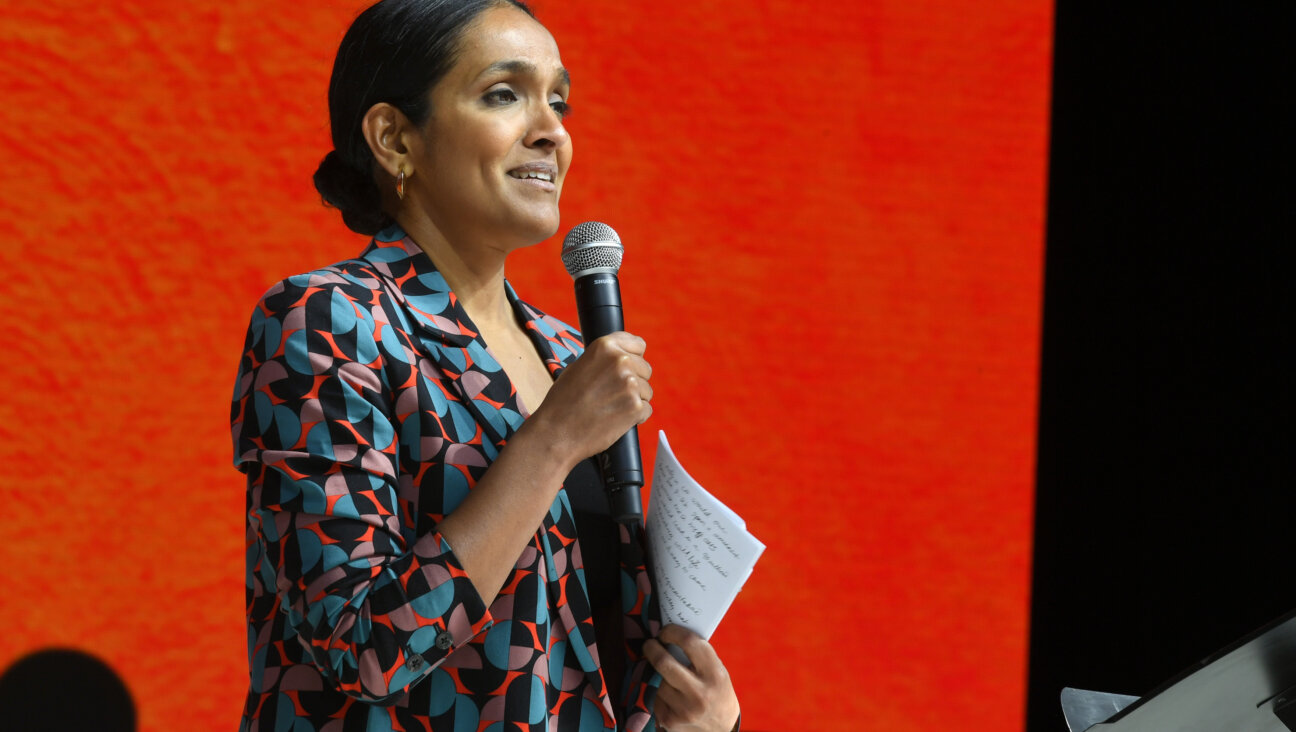Ultra-Orthodox Rejoice After Lawmaker Forces New York To Relax Yeshiva Rules

Graphic by Angelie Zaslavsky
Through the extreme efforts of a rogue lawmaker who held the entire state budget hostage, New York’s powerful Hasidic groups may have found a way to derail a movement to force them to improve the secular education they give their children.
A provision forced into New York state’s budget by Simcha Felder, and supported by some of the state’s Hasidic groups, may ease a longstanding requirement in state law that the education at private religious schools be “substantially equivalent” to that offered at public schools. Critics of some Hasidic yeshivas say they shortchange secular subjects, like math and history, to the point that they impair their graduates’ ability to function in society.
The new provision was custom-written for Orthodox yeshivas, and appears to only apply to them. Felder, a state senator, threatened to derail the entire state budget if the provision was not included. Hasidic leaders have greeted it as a major win for their community, though its practical implications remain far from clear.
“The entire private school community from every religious persuasion, will forever remember [Felder] for protecting their freedoms,” wrote Aron Wieder, a Rockland County legislator and a member of the Belz Hasidic community, on Twitter.
Advocates for reform of the Hasidic yeshiva system acknowledged that the provision was a setback, even as they were working to understand its implications.
“Even if there’s no substantial change in the essence of the law, at the very least it muddies the water… for some people,” said Naftuli Moster, founder of the advocacy group YAFFED, which has led the yeshiva reform movement.
Felder, who represents a swath of heavily-Orthodox neighborhoods in Brooklyn, is key to the Republican’s control of the Senate chamber, and holds an unusual amount of power there. His efforts angered some of his colleagues. Kenneth Zebrowski, who represents parts of Rockland County in the Assembly, said that he had voted against the entire budget in protest of Felder’s yeshiva provision. “I think it’s highly objectionable that a State Senator in the eleventh hour decided to hold the budget up in order to take away the state education department’s authority to regulate curriculum,” Zebrowski said. “That’s their job.”
YAFFED’s advocacy has drawn increasing attention to the issue of secular education at Hasidic yeshivas in recent years. Its complaint to New York City’s education department about the inadequacies of the education at a list of thirty-odd Brooklyn yeshivas sparked an investigation that it still ongoing more than two years after it began. In response to the investigation, Orthodox groups created an advocacy organization called PEARLS that has made the case that the education provided at Orthodox yeshivas is already sufficient.
YAFFED had relied heavily on existing state law that requires that private schools offer substantially equivalent education to what’s offered at public schools. The law, which is infrequently if ever enforced, requires that the curriculum at private schools be “least substantially equivalent to the instruction given to minors of like age and attainments at the public schools of the city or district where the minor resides.”
In the closing stages of the budget process, Felder attempted to exempt yeshivas from that provision. PEARLS itself was not involved in Felder’s effort, but individual Hasidic groups were. A person directly involved told the Forward that followers of Zalman Teitelbaum, the Williambsurg, Brooklyn-based Satmar Hasidic rebbe, were consulted on the original language of the provision. The Israeli news site bhol.co.il reported that the other Satmar rebbe, Aron Teitelbaum of Kiryas Joel, was directly involved in the negotiations.
The new provision, which passed as part of a budget package during the Passover holiday on Friday night and has yet to be signed by the governor, applies only to not-for-profit private schools with long school days. That seems to mean it applies only to Orthodox yeshivas, where school days begin early in the morning and run late into the night. For those schools, the new law lays out exactly how the state education department should determine whether the education they provide is substantially equivalent to that offered at public schools.
The language in the new provision about elementary and middle schools offers a likely win for the yeshivas. The language of the provision is specific, and spells out what yeshivas do — and, by implication, do not — need to teach. The provision specifically lays out curricular goals for English, math, history, geography, civics, and science. But it makes no mention of arts or music. And the language about the curricular goals is notably narrow. It requires that students have an “understanding of civics and the responsibilities of citizens in world communities,” for example, but not an understanding of the workings of the U.S. government.
“These are things not for legislators to be codifying,” Zebrowski said.
For high schools, the provision is less specific, and requires that the schools offer instruction that “develops critical thinking skills” which result in a “sound basic education.” The phrase “sound basic education” may actually be a rather high bar for the yeshivas to meet. Michael Rebell, a professor at the Teacher’s College at Columbia University and an expert in education law, said that the phrase is defined in a major lawsuit he brought against the state, Campaign for Fiscal Equity v. State of New York, as being able “to function productively as civic participants capable of voting and serving on a jury.” That requires a working knowledge of subjects such as science, which goes beyond what some Hasidic yeshivas currently offer.
In its final form, the provision also includes language that gives the state education department the leeway to include other factors in its determination of whether a private school’s curriculum meets the legal standard. That appears to give the state education department the authority to largely ignore Felder’s provision, and seems to have been the result of wrangling by the Assembly.
“The senate was at, ‘let all schools do exactly what they want without any input of the state education department,’ and I think the Assembly was scratching and clawing to try to get some acceptable language to maintain the state education department’s regulatory authority,” Zebrowski said.
Rebell, for his part, said that the provision itself may be unconstitutional, based on the U.S. Supreme Court’s 1993 decision in a case over the creation of the public school district in the Hasidic New York village of Kiryas Joel, in which the court found that creating a school district for a specific religious group violated the Establishment Clause of the U.S. Constitution. Rebell said the new provision appears to have been written specifically for Orthodox Jews, and could similarly be found to unconstitutionally advance a particular religion.
Felder did not respond to a request for comment. A spokesman for the Senate Republican majority, Scott Reif, said that the bill was meant to change how yeshivas are evaluated. “The provision requires [the state education department] to consider the full breadth of curriculum taught at nonpublic schools rather than rigidly comparing them to local public schools and what they do hour to hour,” Reif said.
The provision also gives authority to the state education department to determine whether private schools meet the substantial equivalency standard. That oversight previously rested with local departments of education. The state education department, which was in the process of reviewing how it enforces the substantial equivalency provision, said it was still reviewing the new law.
“We are in the process of reviewing the change in law and are pleased that critical standards – such as substantial equivalence, instruction by competent teachers and English being the language of instruction – have been retained,” the education department said in a statement. “We will incorporate this latest change in law into the guidance, which remains a work in progress.”
Contact Josh Nathan-Kazis at [email protected] or on Twitter, @joshnathankazis.






















